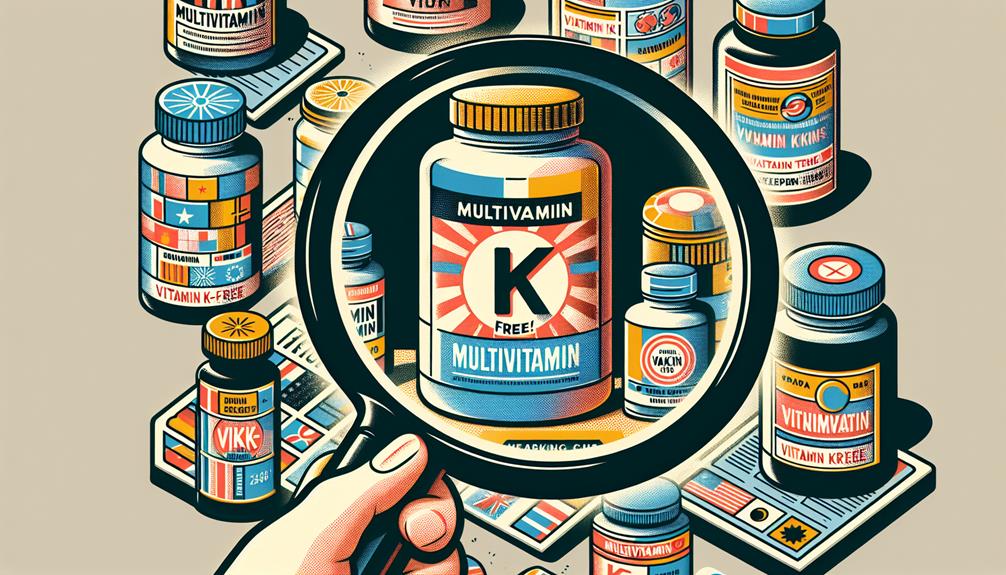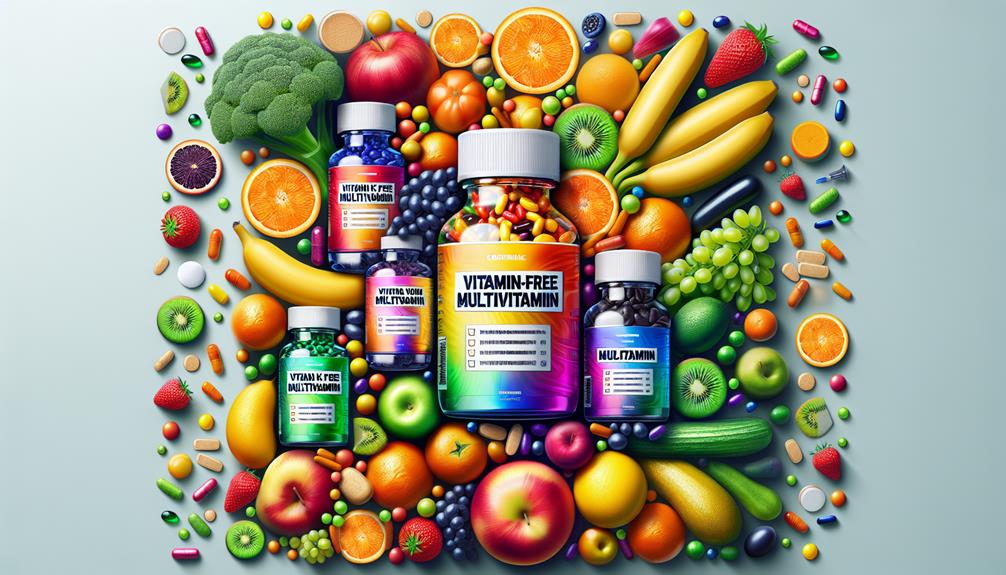


When searching for multivitamins without Vitamin K, consider specific brands designed without it. Choose labels indicating 'vitamin K-free' or lacking it in the ingredients. Steer clear of terms like 'phytonadione' or 'menaquinone,' as they are vitamin K forms. Select alternatives offering essential nutrients minus vitamin K. Guarantee ideal selection for your health needs.
Key Takeaways
- Look for supplements labeled 'vitamin K-free' or without vitamin K in the ingredients.
- Avoid terms like 'phytonadione' or 'menaquinone' as they indicate vitamin K.
- Consider alternative supplements that provide necessary nutrients without vitamin K.
- Check specific multivitamin brands known for being vitamin K-free.
- Seek professional advice for selecting safe and effective supplements.
Importance of Vitamin K in Multivitamins
Understanding the role of vitamin K in multivitamins is essential for maintaining overall health and well-being. Vitamin K plays a critical role in blood clotting and bone health. Concerning functions, vitamin K is vital for the activation of proteins that are involved in blood clotting, guaranteeing that wounds can heal properly and preventing excessive bleeding. Additionally, vitamin K is also crucial for bone health as it aids in the regulation of calcium, a mineral important for bone strength.
A deficiency in vitamin K can lead to serious health issues, such as excessive bleeding and an increased risk of fractures due to poor bone density. Interactions that affect vitamin K absorption include certain medications like blood thinners. These medications can disrupt the body's ability to use vitamin K effectively, leading to potential deficiencies. Understanding these functions, deficiencies, and interactions is critical when considering the inclusion of vitamin K in multivitamins to ensure maximum health benefits.
Common Sources of Vitamin K
Vitamin K is commonly found in various dietary sources, with leafy green vegetables being particularly rich in this essential nutrient. Including foods like spinach, kale, broccoli, and Brussels sprouts in your diet can help prevent Vitamin K deficiency. Apart from vegetables, Vitamin K can also be sourced from other foods like fruits, dairy products, meat, and fermented foods. It's important to maintain a balanced diet to make sure you're getting an adequate amount of Vitamin K to support blood clotting and bone health.
While Vitamin K is vital for your body, excessive intake can lead to Vitamin K toxicity, especially when consumed through supplements. It's generally recommended to obtain Vitamin K from food sources rather than relying solely on supplements to avoid potential risks of overconsumption. By being mindful of your dietary choices and including a variety of Vitamin K-rich foods in your meals, you can maintain top levels of this essential nutrient without the need for supplementation.
Reasons to Avoid Vitamin K

To maintain peak health, it may be necessary to be cautious about excessive intake of Vitamin K, as it can lead to potential risks such as Vitamin K toxicity. While Vitamin K is essential for blood clotting and bone health, consuming high doses through supplementation can pose risks. Potential risks of excessive Vitamin K intake include interference with certain medications like blood thinners, leading to reduced effectiveness or increased clotting risks. Additionally, individuals with certain health conditions or dietary restrictions, such as those on anticoagulant therapy, may need to limit their Vitamin K intake to maintain proper health management. It is important to be mindful of the amount of Vitamin K consumed from both food sources and supplements to avoid adverse effects. By understanding the potential risks associated with high levels of Vitamin K and adhering to dietary restrictions when necessary, you can help maintain a balanced and healthy lifestyle.
Health Conditions Requiring Vitamin K Avoidance
Avoiding Vitamin K is crucial for individuals with specific health conditions that require careful management of their dietary intake. Vitamin K interacts with certain medications like blood thinners, such as warfarin, and can disrupt their effectiveness. Patients on these medications need to maintain consistent vitamin K intake to guarantee their medication works properly. Additionally, individuals with certain clotting disorders, such as thrombosis, may need to avoid vitamin K to prevent complications.
Dietary restrictions for those needing vitamin K avoidance include limiting green leafy vegetables like kale, spinach, and broccoli, which are abundant sources of this vitamin. It is important for individuals with these health conditions to read food labels carefully and be cautious of foods fortified with vitamin K. Seeking guidance from a healthcare provider or a registered dietitian can assist in creating a balanced diet plan that meets nutritional needs while avoiding excessive vitamin K intake.
Tips for Choosing Vitamin K-Free Multivitamins

When searching for vitamin K-free multivitamins, it is crucial to pay close attention to the ingredient list. Opt for supplements explicitly labeled as 'vitamin K-free' or those that do not list vitamin K (including its various forms like K1 and K2) among the ingredients. Be cautious of terms like 'phytonadione' or 'menaquinone,' as these are different forms of vitamin K that should also be avoided. Additionally, consider supplement alternatives that provide the necessary vitamins and minerals without vitamin K, such as vitamin K-free versions of individual nutrients or specialized multivitamins designed for individuals with dietary restrictions. By being vigilant about checking labels and exploring supplement options, you can effectively meet your nutritional needs while adhering to your dietary restrictions.
Top Brands Offering Vitamin K-Free Options
Consider exploring reputable supplement brands like Nature Made and Garden of Life that offer vitamin K-free options for individuals with specific dietary needs. These brands understand the importance of catering to individuals with dietary restrictions and allergen concerns. Nature Made is known for its wide range of vitamins and supplements, including multivitamins without vitamin K, which can be suitable for those who need to avoid this nutrient. Garden of Life, on the other hand, is a brand that focuses on organic and non-GMO products, providing vitamin K-free multivitamin options for individuals with allergen concerns.
When choosing a multivitamin without vitamin K, it's crucial to look for brands that prioritize quality and transparency in their ingredients. By opting for trusted brands like Nature Made and Garden of Life, you can guarantee that you are getting a reliable product that meets your specific dietary requirements. Always remember to check the labels carefully to confirm that the multivitamin is indeed free of vitamin K and suitable for your needs.
Potential Benefits of Vitamin K-Free Multivitamins

When choosing a multivitamin without vitamin K, you can benefit from meeting specific dietary restrictions and allergen concerns. These formulations cater to individuals who need to avoid vitamin K due to medical conditions or medications that interact with this nutrient. While vitamin K is essential for blood clotting and bone health, some may require K-free options to manage their health effectively. By opting for a vitamin K-free multivitamin, you can support nutrient absorption and prevent potential deficiencies. These multivitamins are designed to provide a wide range of vitamins and minerals that are important for overall wellness. Additionally, vitamin K-free multivitamins can promote digestive health by excluding a nutrient that may not align with your specific needs. By choosing a multivitamin without vitamin K, you can address your dietary restrictions and allergen concerns while supporting your body's requirements for excellent health and wellness.
Consultation With Healthcare Provider
It is important to consult with your healthcare provider before making any changes to your supplement regimen. When considering multivitamins without vitamin K due to dietary restrictions or other reasons, your healthcare provider can offer valuable insights tailored to your individual health needs. They can assess your current health status, medications, and any specific dietary restrictions you may have that could impact the choice of multivitamin.
Your healthcare provider can also discuss supplement alternatives that are suitable for you. They may recommend specific multivitamin brands that do not contain vitamin K or suggest alternative nutrients to guarantee you meet your daily vitamin requirements. Additionally, they can provide guidance on the dosage and frequency of the supplements to optimize their effectiveness without causing any adverse effects.



